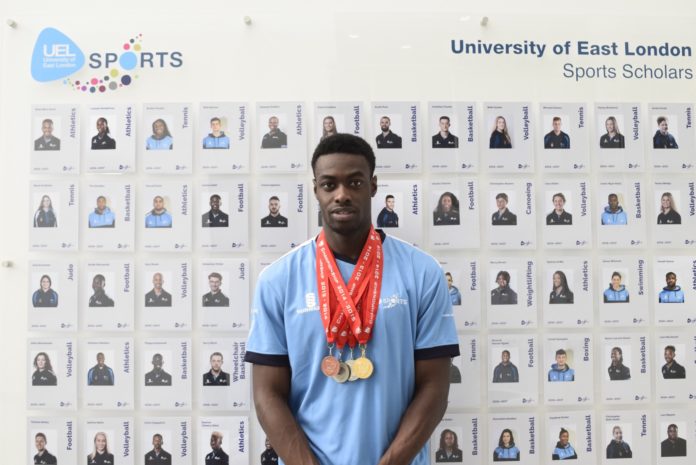Omolulu Abiodun, is an aspiring British and UEL sprint elite and BUCS 200m Indoor and Outdoor champion. With his 2017 season off to a flying start, the British University Champions (BUCS) champion spoke to Rising East.
He was born at Whipps Cross Hospital in East London to a Nigerian family. Asked about his future he said: [Laughing] “There’s a question mark at the moment, am still just trying to see how things goes first. If GB is right for me then I will stick with team GB, and if Nigeria is right for me then I will stick with Nigeria”.
UEL sports editors Kwame KUFUOR and Conner Mackay spoke to Omolulu.
Kwame Kufuor: How did you get involved in Rising East QA?
Omolulu Abiadun: “I had a phone call from Kwame who pitched the QA to me, and I thought it was brilliant”.
KK: Have you fully recovered from your hamstring injury?
OA: “Yes, I have fully recovered”.
KK: Are you competing in any competition at the moment?
OA: “No, not at the moment, I just finished my indoors so I have two months to prepare for my outdoors, so am focusing on my outdoors”.
KK: How many medals have you won?
OA: “I think six”.
KK: What’s the most difficult part in your training as an athlete?
OA: “Running hills, [Laughing] that’s the most difficult, but is the one I work hard at so that I can get the full benefits from it”.
KK: How much strain does your hectic training have on your hamstring?
OA: “Is been up and down really, I have a few niggles for the last two months, but I think is all coming together now. The rehab work is really working right now. At the moment [I] am good, there’s not much stress anymore”.
KK: How supportive have your friends and family been, through this journey?
OA: “Yes, I have so much love and support from family and friends and even new friends, they are like my rock, and they are the ones that guide me to be the person I am today. As long as I have them by my side I can do anything really”.
KK: How important is being an athlete means to you?
OA: “It means everything to me, I find it hard to stay off track because I’m always putting it first. Sometimes even if am doing my school work I still find it a struggle because I know I should be doing my school work but also I need to be working hard on the tracks, because that’s what’s getting me from A to B. That’s what got me here in the first place so my faith and everything I put into my sports. Hopefully everything will work out at the end for me, the results are coming through and I need to be patient”.
KK: How do you combine being a full-time athlete and a full-time student?
OA: “It’s very difficult, deadlines upon deadlines and I have got competition as well which is also difficult. Luckily, I talk to some of the lecturers so they can give me heads up. They can sometimes rearrange stuff.”
KK: How important is it to focus on the mental side of being an athlete?
OA: “Very important, if you don’t believe in yourself it’s never going to happen for you. Over the years, I have really got that mental toughness now, I can take things on the chin and learn from my mistakes, which has helped my mental toughness”.
KK: Describe the social life of an athlete?
OA: “We don’t really get a social life to be honest. I train 11 months and get a month off, so that’s my social life. When I get that month off that’s when I can get to go on holidays and partying to enjoy myself”.
KK: Are you married or single?
OA: “ Nah, [Laughing] I put my running first, and everything else will kind of fall in place once I have got that set. I have a bigger plan just to work hard and go for my goals but if someone comes along that journey then I won’t complain”.
KK: What are your aspirations?
OA: “To become an Olympic champion”.
KK: What kind of advice will you give to young athletes joining UEL for the first time?
OA: “They should understand their environment, and also ask for help if required because there’s a lot of people there to help “.
This goes to show hard work pays off at the end and an athletes can possibly combine their education with being an athlete.




